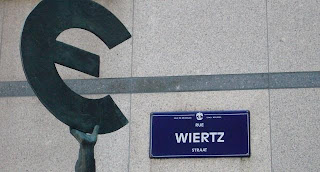Learning about the passing away of visionary and creative genius Hiroshi Yamauchi who took the Japanese traditional board- and card-game company Nintendo under his leadership for more than fifty years, producing a multitude of arcade games and then gaming consoles for home use, I was reminded about this poster of spiraling constellations that chart all the games produced during the company's most prolific period from Pop Chart Labs.
 With such a memorable cast of characters, studying the accompanying manuals, legends and bestiaries were almost as engrossing as playing the games itself. Almost. While its competitors sought to deliver flashier graphics and greater computing power, Nintendo endured by remaining true to family of avatars—many the inventions of designer Shigeru Miyamoto, another pioneer Yamauchi encouraged, like Zelda and the Brothers Mario, that frankly made the others look like road-kill, and challenging environments, with innovative interfaces from the gun for Duck Hunt, R.O.B. the little robot challenger, a microphone in the Japanese version that could be used to shout down certain enemies, the power glove, to the Wii controllers, which pulled players into the game, more than any degree of realism could hope to. Thanks for all the endless hours and entertainment, Mr. Yamauchi, and know that your legacy lives on.
With such a memorable cast of characters, studying the accompanying manuals, legends and bestiaries were almost as engrossing as playing the games itself. Almost. While its competitors sought to deliver flashier graphics and greater computing power, Nintendo endured by remaining true to family of avatars—many the inventions of designer Shigeru Miyamoto, another pioneer Yamauchi encouraged, like Zelda and the Brothers Mario, that frankly made the others look like road-kill, and challenging environments, with innovative interfaces from the gun for Duck Hunt, R.O.B. the little robot challenger, a microphone in the Japanese version that could be used to shout down certain enemies, the power glove, to the Wii controllers, which pulled players into the game, more than any degree of realism could hope to. Thanks for all the endless hours and entertainment, Mr. Yamauchi, and know that your legacy lives on.
Friday 20 September 2013
playable character or level-boss
Thursday 19 September 2013
invisible hand
There are quite a few conflated statements and actions in
circulation regarding America's economy and monetary policy. While
it is true that raising a debt-ceiling does not in fact increase
overall debt, rather just re-calibrates a county's ability to fulfill
its outstanding obligations, and despite evidence to the contrary
about past fiscal cycles, history and precedence and possibly the
very definition of madness in expecting any other outcome, such a
correction does not necessarily speak to thrift and discipline. On
the contrary, a commitment to not default and continue to match the
caretaking and stewardship responsibilities of a government
demonstrates a discipline usually understood to be the opposite.
catagories: 💱, foreign policy
Wednesday 18 September 2013
polling place or fragenbogen
 A section of the German electorate is gifting its ballots to expatriates and EU citizens unable to influence the outcome of the campaign via a social-media group called Electoral Rebellion in order to lend a voice to those outliers affected by Germany's stance in the European Union, like the Spaniards and Hellenes in the face of austerity measures and others further afield with the potential to be touched by new German policy. From a legal standpoint, it appears, that the volunteers are simply soliciting the advice of foreigners, and participants—with no expectation of quid pro quo, would have probably voted for the candidates most sympathetic to the views of those voting by proxy, but the action does raise a needed discussion on supra-national politics and infringements as well. What do you think? Is this action, stunt not far from buying and selling votes or a broader and necessary world-view?
A section of the German electorate is gifting its ballots to expatriates and EU citizens unable to influence the outcome of the campaign via a social-media group called Electoral Rebellion in order to lend a voice to those outliers affected by Germany's stance in the European Union, like the Spaniards and Hellenes in the face of austerity measures and others further afield with the potential to be touched by new German policy. From a legal standpoint, it appears, that the volunteers are simply soliciting the advice of foreigners, and participants—with no expectation of quid pro quo, would have probably voted for the candidates most sympathetic to the views of those voting by proxy, but the action does raise a needed discussion on supra-national politics and infringements as well. What do you think? Is this action, stunt not far from buying and selling votes or a broader and necessary world-view?
catagories: 🇩🇪, 🇪🇺, 🇬🇷, economic policy, foreign policy, networking and blogging
shutter-bug
Monday 16 September 2013
biometrics or cutting off your nose to spite your face
Not long ago, a group of hacktivistas requisitioned the fingerprints of a high ranking German minister from a water glass in order to illustrate inherent flaws in the personal security prescription that the minister was championing.
 The lifted prints were circulated and used in this experiment for impersonation, showing that any element of biometric data released into the wilds (that's why it proves useful for police in forensics) is prone for use and abuse and not such an advisable method for locking and unlocking personal troves. Of course, passwords not generally circulated are prone to other methods, but owning that false-sense of security is an expensive proposition. For the interim, I can envision people doffing and donning their shoes and socks for verification-purposes. There are of course methods to suppress ne'er-do-wells but I wonder with thieves wearing charm necklaces of trophy thumbs and toes if the sort of safety that is being sold to us is possible.
The lifted prints were circulated and used in this experiment for impersonation, showing that any element of biometric data released into the wilds (that's why it proves useful for police in forensics) is prone for use and abuse and not such an advisable method for locking and unlocking personal troves. Of course, passwords not generally circulated are prone to other methods, but owning that false-sense of security is an expensive proposition. For the interim, I can envision people doffing and donning their shoes and socks for verification-purposes. There are of course methods to suppress ne'er-do-wells but I wonder with thieves wearing charm necklaces of trophy thumbs and toes if the sort of safety that is being sold to us is possible.
catagories: 🇩🇪, 💡, 🥸, networking and blogging
mmm mmm mmm mmm or tip of the tongue
As part of its weekly digest of innovative and new ideas, the excellent blog Brain Pickings features an interesting review of a new work from Clive Thompson about how technology are collaborating in positive ways to augment how we remember, learn and triangulate novel and familiar concepts. The book, “Smarter than You Think: How Technology is Changing our Minds for the Better,” smartly covers a lot of emergent and age-old praises and cautions and is by no means swerving to avoid the counter-argument or discussion, neither a retreat into apologies for new standards of etiquette and work-ethics nor a luddite bemoaning short attention-spans and information overload, but rather presents an extended thesis that certain aspects of on-line resources can prove to be transcending, proving one knows how these tools function.
catagories: 📚, 🧠, networking and blogging, philosophy, technology and innovation
Sunday 15 September 2013
is there in truth no beauty?
 Artist Juan Ortiz gives the original Star Trek series the brilliant treatment of re-imaging each of the the eighty episodes in classic movie-poster-form. At the link, one can purchase the collection and browse images. Though the title of individual shows might escape even the greatest and most-studied of fans, all are rife with iconic images that certainly take well to one of the pulp but defining art forms of contemporary (retro) times. Though maybe not all episodes of nostalgic television could be re-imagined as such, do you have memorable viewing experiences, either first- or second-hand that ought to be committed to this very portrayal, like your neighbours joining your parents to watch the finale of M*A*S*H*, Tatort or The Outer Limits?
Artist Juan Ortiz gives the original Star Trek series the brilliant treatment of re-imaging each of the the eighty episodes in classic movie-poster-form. At the link, one can purchase the collection and browse images. Though the title of individual shows might escape even the greatest and most-studied of fans, all are rife with iconic images that certainly take well to one of the pulp but defining art forms of contemporary (retro) times. Though maybe not all episodes of nostalgic television could be re-imagined as such, do you have memorable viewing experiences, either first- or second-hand that ought to be committed to this very portrayal, like your neighbours joining your parents to watch the finale of M*A*S*H*, Tatort or The Outer Limits?











